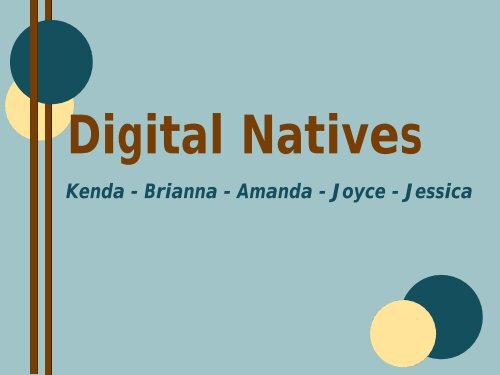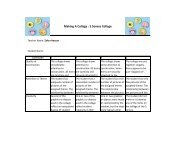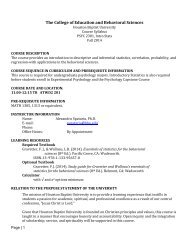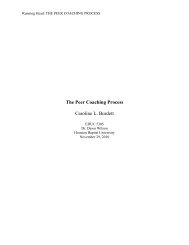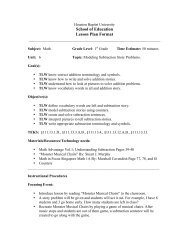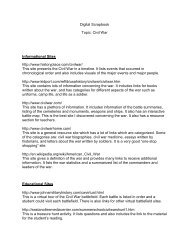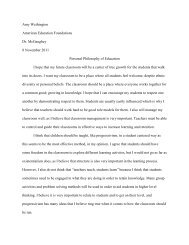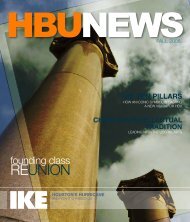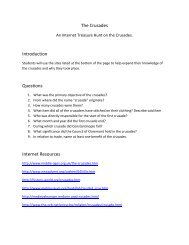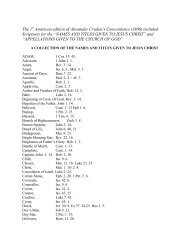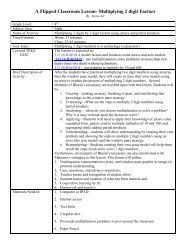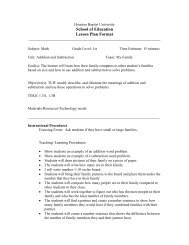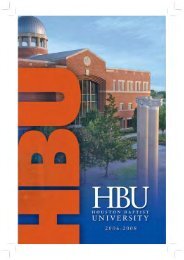You also want an ePaper? Increase the reach of your titles
YUMPU automatically turns print PDFs into web optimized ePapers that Google loves.
<strong>Digital</strong> <strong>Natives</strong><br />
Kenda - Brianna - Amanda - Joyce - Jessica
Perspectives on Teaching Practices<br />
Prensky<br />
• Step-by-step practices<br />
(Preferred by teachers)<br />
and linear approach is not<br />
engaging enough<br />
• <strong>Digital</strong> immigrants<br />
(teachers) teaching in<br />
a 'foreign language' by<br />
using this approach<br />
Tapscott<br />
• Compares current<br />
education practices to<br />
torture<br />
Both outline ways in which educators can turn<br />
learning a more interactive experience<br />
Example: Video Games
Legacy Learning Vs. Future Learning<br />
Prensky: "Today's teachers<br />
have to learn to<br />
communicate in the language<br />
and style of their students."<br />
• Change Methodology<br />
• Change Content<br />
Jaime McKenzie: Author of<br />
<strong>Digital</strong> Nativism <strong>Digital</strong><br />
Delusions and <strong>Digital</strong><br />
Deprivation<br />
• Progressivist have argued<br />
for learning that appeals<br />
to senses and sparks<br />
curiosity.
Prensky vs. McKenzie<br />
Prensky<br />
• Stereotype of generations<br />
• Endorsement of games<br />
McKenzie<br />
• Other reports say<br />
otherwise<br />
• Harmful effects<br />
• "learning can't (shouldn't)<br />
be fun"<br />
• Progressive educators
Integration on video games<br />
Prensky and Tapscott (Author of Educating the Net<br />
Generation 1999)<br />
• Both believe that integrating video games into school for<br />
children would be helpful<br />
• Tapscott (unlike Prensky) notes that any change to the<br />
school system will face "financial cut backs, low teacher<br />
morale, increased work loads, and reduced retraining<br />
budgets."
Do They Really Think Differently?<br />
Objections:<br />
• "It may be that there is as much variation within the digital<br />
native generation as between the generations."<br />
• Can a whole generation have a specific learning style?<br />
o Based on the individual<br />
o Based on previous success<br />
• Muti-tasking:<br />
o Loss of concentration<br />
o 'Cognitive Overload'<br />
o Older generation and TVs
Pros and Cons<br />
Pros<br />
• <strong>Digital</strong> immigrants can learn<br />
how digital natives learn and<br />
how they can teach them as<br />
well.<br />
• They learn to work with them<br />
and not against them<br />
• <strong>Digital</strong> natives thrive and<br />
learn more using technoligal<br />
education.<br />
• <strong>Digital</strong> immigrants can learn<br />
to incorporate technology<br />
into their teachings<br />
Cons<br />
• <strong>Digital</strong> natives may lose the<br />
foundation of textbook<br />
reading and research which is<br />
needed to support<br />
technological education.
Bibliography<br />
"<strong>Digital</strong> Nativism, <strong>Digital</strong> Delusions, and <strong>Digital</strong> Depravation" by Jamie<br />
McKenzie<br />
http://fno.org/nov07/nativism.html<br />
A Changing World: Does Mark Prensky get an "A" or detention? By<br />
Nathaniel Stone<br />
http://mpctforum5.pbworks.com/f/NStone_Digichange+Mod.pdf<br />
The 'digital natives' debate: A critical review of the evidence<br />
British Journal of Education Technology Vol 39 No 5 2008 Bennett, Maton, Kervin<br />
http://onlinelibrary.wiley.com/doi/10.1111/j.1467-8535.2007.00793.x/pdf


